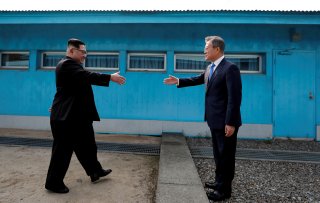How Do Unification Politics Thwart Ending the Korean War?
An end to the Korean War through unification, unfortunately, seems highly unlikely within the next five years.
Editor’s Note: As the world commemorates the 70th anniversary of the start of the Korean War, the Center for the National Interest‘s Korean Studies team decided to ask dozens of the world’s top experts a simple question: Do you believe that the Korean War will finally come to an end before its next major anniversary in 2025? The below piece is an answer to that question. Please click here to see even more perspectives on this important topic.
Korea watchers and foreign policy wonks alike often cite the high tensions and unparalleled military buildup along the 38th parallel as barriers to the end of the Korean War. Scary and substantial contingencies could bring violent and swift changes in the latent military standoff. A contingency such as government collapse or outside intervention would be devastating to Koreans and upset regional geopolitics. It would also have severe and deadly repercussions for the United States, South Korea’s treaty ally, with twenty-four thousand troops on South Korean soil and fifty thousand to support in Japan. However, even amid tense, risky times when the brink of combat seemed imminent, the quiet war continued. The so-called Last Bastion of the Cold War endures.
The most preferable outcome for everyone—civilians and soldiers, political elites and diplomats, businessmen and investors—is a negotiated settlement to the Korean War. In the 1990s, the German model inspired plans and predictions for unifying a two-state nation. Parallels between the two cases abound, including a deep-seated ethnonational identity and Cold War patrons upholding militarized division. But the moment for a German-style unification has passed. Strategic balance and changing geopolitics notwithstanding, deeper political forces working against the end of the standoff and unification of the Peninsula presage the Korean War’s 75th birthday in 2025.
At the legal level, both North and South claim control of the entire Korean Peninsula. The constitutional preambles of both countries enshrine this principle. In North Korea’s vision, Kim Il-sung—and his son and now grandson—are the “lodestar of reunification” and unification is the supreme task of the country under North Korea’s social revolutionary movement. In South Korea, the peninsula’s reunification centers on principles of freedom and democracy in both the preamble and the first chapter of its constitution. Ending the Korean War requires that one or both sides amend their very legal foundations.
While laws can be changed, both countries base political legitimacy on sole control of the peninsula. Virtually incompatible political and economic systems raise the stakes even higher. A liberal democracy simply cannot meld with a totalitarian autocracy: one political system needs to fold and cede control to the other. The North Korean leadership exerts absolute control under the hand of one man, or perhaps woman, utilizing severe punishments and surveillance technologies to root out counter-regime activity. In South Korea, the vibrant democratization movement against their military dictatorship in the 1980s led to democratic deepening in the 1990s. President Park Geun-hye’s impeachment in 2017, brought about by peaceful marches of two million people against the government, attests to the power of civil society there today.
These political worldviews are embedded in the everyday societies to the north and south of the DMZ. How could North Koreans, who revere their leader as a godlike figure and live in isolation and autarky, come to terms uniting with South Koreans, whose national identity has now embraced globalization and economic integration—with an electronics and media export industry to match—and vice versa? The South Korean public, surveys show, are increasingly wary of reunification based on concerns for social differences and economic burden. Younger generations, women, and conservatives, in particular, prefer peaceful coexistence over unification.
Inter-Korean summits may promise a thaw in relations, but they must be accompanied by changes in thinking as well as substantial and sustained political will from not only elites but also society at large. While an important dream for us to realize in the near future, an end to the Korean War through unification, unfortunately, seems highly unlikely within the next five years.
Darcie Draudt is an advisor for Public policy at StratWays Group and a PhD candidate at Johns Hopkins University's Department of Political Science.
Image: Reuters

